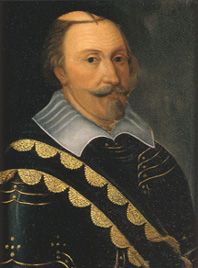
 In 1593, Sweden and all Swedes got their very first National Contract at the Uppsala Synod. It was a Contract, Agreement or Covenant between King, Church and People that officially made the Kingdom Lutheran under the Augsburg Confession. Until that time, Sweden, though it had broken with the Roman Catholic Church some 60-70 years before, had no official confession of faith.
In 1593, Sweden and all Swedes got their very first National Contract at the Uppsala Synod. It was a Contract, Agreement or Covenant between King, Church and People that officially made the Kingdom Lutheran under the Augsburg Confession. Until that time, Sweden, though it had broken with the Roman Catholic Church some 60-70 years before, had no official confession of faith.
The purpose of this article is not to endorse the specific Contract and its contents but to promote the idea of the importance of a new National Contract for all Swedes that is genuinely libertarian. This old Contract may be said to have been ended on 1 January 2000 when the Swedish State and the [Lutheran] Church of Sweden officially parted company. Whether that was a good or bad thing is hard to say and it is not my purpose to debate that issue on this Religion page. Rather what I would like to advance is what I feel to be an urgent need for Sweden to redefine itself as a non-secular, non-religious libertarian state for everyone and to once and for all break with its totalitarian socialist roots. Sweden needs a People's Contract to defend the rights of its citizens and to allow a proper pluralism that respects the rights of all to form voluntary religious or secular, collective or private, associations of free individuals.
Back in the late 1500's practically all Swedes were Christians and Monarchists so there was never any question of a secular state being established at that time. Facing, as Protestant Sweden was in that period, a militant, autocratic Catholic Church determined to win the Protestant areas of Europe back to Rome by any and all means at its disposal - military force and theological persuasion (the Counter Reformation), a unified Swedish State was essential for survival. So it is not surprising that at that time Catholicism was banned (since arguably it was a dangerous extremist organisation threatening the liberties of a once enslaved peoples), even if banning another Protestant denomination might seem a little extreem to us today.
The justification to create a uniformist state (in this case, a Lutheran one) is understandable given the age. England had done the same, making the Anglican Church (Church of England) the only state religion and persecuting all the others. It too faced the Catholic threat and defeated it, as Sweden did in its continental wars. Protestant Europe owes Sweden an emormous debt of thanks for preserving the freedoms that have been our legacy ever since.
Lutheran Sweden simply continued the totalitarianism of the former Catholic Monarchy in a totalitarian age so we have to understand the Uppsala Contract in its proper context. Aside from banning the Zwingli denomination (which can only have been motivated by the totalitarian mindset of the Lutheran leadership at the time), the Uppsala Meeting was a good and necessary thing for Sweden lying as it was on the cusp of the 16th and 17th centuries. It was far from perfect or ideal but it was a major step in the right direction, and by and large it was in harmony with the feelings of the majority of the people even without a democratic system to formally mandate it.
As discussed in the Introduction to the Politics Page, Sweden did not follow a similar path to Great Britain in its pursuit of liberal democracy, but took on board new totalitarian elements at the beginning of the 20th century in the wake of the Bolshevik Communist revolution in Russia in 1917. As a result, not only did the Lutheran Church retain its control of the religious scene far longer than, for example, the Anglican Church did in Great Britain, persecuting dissent and non-conformist Churches, but in the absence of the kind of British libertarianism experience that would have mellowed the nation to become a more tolerant one, transferred this authoritarian conformism into the secular political arena. When it dispensed with the Lutheran Church in 2000, having effectively made it into a politically-correct independent branch of the establishment, what was left was the same authoritarianism of the past at the core of state life but with a thick layer of democracy on top. Instead of religious autocracy, secular autocracy has persisted. The Church was more or less replaced by a community-type autocracy.
For this reason, Sweden has always felt a natural affinity with its southern neighbour, Germany, in contradistinction to its Scandinavian neighbour, Norway, which has tended to look west across the North Sea to Britain. Currently Sweden has a German Queen. And so, in spite of a brief political union following the Napoleonic Wars, during which the Swedish monarch was also King of Norway, Sweden and Norway have always had two very different spiritual outlooks, in spite of the closing gap between their political differences and in spite of the fact that both were, until recent times, Lutheran states.
As a Christian I do have some sympathies with traditional Lutheran values though little in common with modern politically-correct Lutheranism. What I should like to do on this webpage is propose a set of values which both religious and secularist people could agree to as part of a new 21st Century Swedish Contract. I have no wish to impose my religious and philosophical beliefs on anyone. However, I do feel it to be my duty to find common ground with my neighbour, be he or she Humanist, Christian, New Age, Buddhist, Muslim or Jewish or anyone else. That is the purpose of this page, to represent the Swedish homeschooling community which has a pretty representative cross-section of religious and non-religious beliefs.

